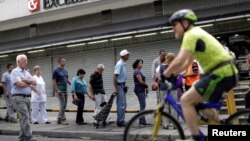President Nicolas Maduro pledged Saturday evening to go after his political foes with the virtually unlimited powers of a constituent assembly being elected Sunday, while Venezuela’s opposition made a last-ditch effort to flood streets across the country in defiance of hundreds of thousands of soldiers and police.
In an address on state-run television, Maduro made clear he wants the assembly to strip opposition legislators of their constitutional immunity from prosecution and jail at least one.
“This little Hitler has his cell guaranteed!” Maduro shouted, using his frequent nickname for Freddy Guevara, a hard-line opposition leader and one the highest-profile organizers of four months of protests against the government.
Opposition boycott
The opposition is boycotting Sunday’s vote, contending the election has been structured to ensure Maduro’s ruling socialist party continues to dominate. All 5,500 candidates for the 545 seats in the constituent assembly are government supporters.
The vote’s success will be measured by turnout, with the opposition urging Venezuelans to stay away and the government encouraging participation with tactics that include threats to state workers’ jobs and social benefits like subsidized food for the poor.
Maduro indicated he is eager to prosecute many more members of the opposition parties that control a handful of state governments along with the National Assembly, providing one of the few remaining checks on the power of the socialist party that has ruled this OPEC nation for nearly two decades.
“The right wing already has its prison cell waiting,” the president said. “All the criminals will go to prison for the crimes they’ve committed.”
He added that the constituent assembly’s first task in rewriting the constitution will be “a total transformation” of the office of Venezuela’s chief prosecutor, a former government loyalist who has become the highest-ranking official to publicly split from the president.
Economic crisis
Once one of Latin America’s wealthiest and most stable nations, Venezuela has spiraled into a devastating socioeconomics crisis during Maduro’s four years in power, thanks to plunging oil prices and widespread corruption and mismanagement. Inflation and homicide rates are among the world’s highest and widespread shortages of food and medicine leave citizens dying of preventable illnesses and rooting through trash to feed themselves.
In April, Maduro’s supporters on the Supreme Court tried to strip the National Assembly of its powers, setting off protests and clashes between police and demonstrators that have left at least 113 dead and nearly 2,000 wounded. Although most of the dead have been protesters apparently shot by police and government-linked paramilitaries, Maduro’s government blames the opposition for the violence.
The government has arrested opposition mayors and party leaders but until now has refrained from going after higher-profile politicians whose posts grant them immunity from prosecution.
Washington has imposed successive rounds of sanctions on members of Maduro’s administration and Vice President Mike Pence on Friday promised “strong and swift economic actions” after Sunday’s vote. He didn’t say whether the U.S. would sanction Venezuelan oil imports, a measure with the potential to undermine Maduro but cause an even deeper humanitarian crisis here.
The opposition has organized a series of work stoppages as well as a July 16 protest vote that it said drew more than 7.5 million symbolic votes against the constitutional assembly. It called Saturday for roadblocks to start before dawn Sunday and a mass march on Caracas’ main highway.
Opinion polls say more than 70 percent of the country is opposed to Sunday’s vote. But as many as half of all Venezuelans support neither the government nor the opposition, a phenomenon evident in the glum paralysis that has gripped much of the country as protesters and police wage nightly battles.





